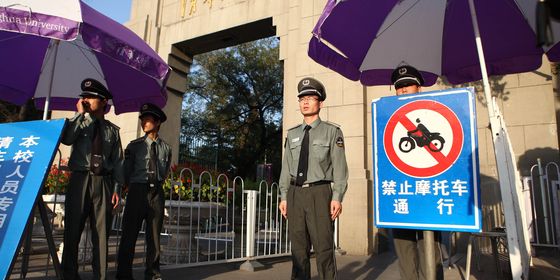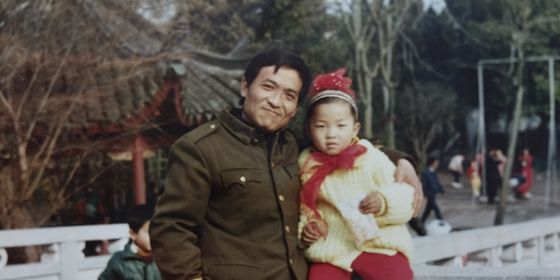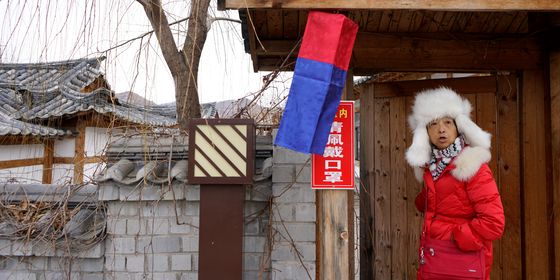The controversial decision to integrate traditional Chinese medicine into Covid-19 treatment
“This is the most useful item [I’ve received],” a Zhihu user, identifying as a Chinese student in the UK, wrote on the question-and-answer platform in April of the box of Lianhua Qingwen granules—along with medical masks, sanitary wipes, and a guide to Covid-19 prevention—she received in a care package from the Chinese embassy .
According to the user, the drug, a herbal decoction based on Traditional Chinese Medicine (TCM), has soared in price in the UK since it was adopted in the the sixth edition of the Chinese National Health Commission’s “Diagnosis and Treatment Protocol for Novel Coronavirus Pneumonia” in February. “Nevertheless…[Chinese students] who stayed [in the UK] are looking for all kinds of ways to buy it,” she claimed.
Since mid-January, the NHC has included TCM in its treatment recommendations for Covid-19, with some official figures claiming a 90 percent success rate for patient recovery. The protocols recommend specific remedies depending on clinical observation, including a decoction of 18 herbal components to be taken three times per day in addition to Western drugs.
Still, the reception of integrated treatments in China has been mixed. TCM has been criticised for its lack of scientific rigor, as prescriptions are personalized and often depend on external factors like season and climate. Many of the remedies are thousands of years old and assign spiritual healing properties to rare animal products, beliefs that are partially responsible for the thriving trade in illegal and endangered wildlife.
TCM is a system of medicine dating back to the Huangdi Neijing, a treatise on medicine attributed to the legendary Yellow Emperor, and encompasses a variety of different treatments such as herbal and nutritional therapy, acupuncture, massage, and physical exercise to restore balance in the body. Since the late 1950’s, the People’s Republic of China has supported the modernization of TCM and its integration with Western medicine. In October, 2019, President Xi Jinping stressed that “traditional medicine is a treasure of Chinese civilization embodying the wisdom of the nation and its people,” according to a report from Xinhua News.
An article from China Daily summarizes three formulas and three medicines recommended for Covid-19 prevention and treatment based on the NHC’s guidelines. Two of the herbal treatments were developed to fight previous epidemics. The Jinhua Qinggan granule was developed to combat the H1N1 pandemic of 2009, and the Xuebijing injection is a blood detoxifier developed during the 2003 SARS epidemic.
“Integrated treatment”—a term used in the National Health Commission protocol—of Covid-19 involves combining TCM with Western drugs and clinical tests, says Dr. Li Suyun, Director of Clinical Nutrition at Beijing’s Shijitan hospital. The idea is “to use Western medicine to deal with some emergencies and Chinese medicine to solve some fundamental problems,” Dr. Li, a self-described “fan” of traditional Chinese medicine, tells TWOC.
By far the most popular TCM remedy for Covid-19 is the “Lung Cleansing and Detoxifying Decoction,” a herbal remedy allegedly derived from several ancient recipes in the Treatise on Cold Damage Diseases, written by physician Zhang Zhongjing in the third century. According to the NHC protocols, the decoction is suitable for “light, moderate and severe patients” and should be taken twice daily with half a bowl of rice soup. It is prepared by boiling 21 herbal components including tangerine peel, ginger, and winter flower.
Huang Luqi, president of the China Academy of Chinese Medical Sciences, told China Daily that 96.1 percent of patients in 10 provinces recovered after taking the decoction in addition to their Western treatments, and none of the cases in the test group worsened.
Tong Xiaolin, a leading researcher at the China Academy for Chinese Medical Sciences, has told Sixth Tone that he believes the lung decoction saves lives: “As of March 13, 1,102 of the 1,261 Covid-19 patients…who used the decoction had recovered.” A clinical study in Beijing found that those who received integrated treatments began recovering two days sooner than those who only took Western drugs.
Despite the hopeful figures, Marc Freard, a member of the Chinese Medicine Academic Council of France told Taipei Times that TCM still “lacks scientific standards of efficacy” because it relies on “individualized treatment.” And a 2012 study of the SARS epidemic from the Cochrane Database of Systematic Reviews found integrating Chinese and Western medicines “made no difference in decreasing mortality versus Western medicines alone.”
Within China, trust in TCM varies greatly by region; Guangdong, Beijing, and Shandong are the three most most accepting provinces and municipalities surveyed in a 2018 project from the Hong Kong Baptist University. Dr. Yan Fang, a TCM practitioner originally from Guangdong province, said he “realized many Wuhanese don’t trust TCM” when he arrived at the Wuhan Hankou Hospital in early February to help contain Covid-19. “We were rejected by some patients, especially young men,” Yan told Sixth Tone.
Other publications including National Geographic have raised concerns about TCM’s effect on animal welfare. One of the government-sanctioned remedies for Covid-19 is Tan Re Qing injection, which contains powder made from bear bile. These recommendations send a contradictory message considering China’s recent efforts to permanently ban the trade and consumption of wild animals.
But doubts about TCM’s efficacy have not dampened the enthusiasm of many Chinese for the treatments. A Xinhua report from January 31 suggesting the herbal remedy Shuanghuanglian (双黄连)could “inhibit” Covid-19 triggered nationwide panic buying. The decoction quickly sold out at pharmacies and online.
TCM drugs such as Lianhua Qingwen and Jinhua Qinggan have become standard offerings in the care packages sent to Chinese citizens abroad by the Overseas Chinese Charity Foundation of China, as well as private enterprises, foundations, and embassies. However, Dr. Li is skeptical about the efficacy of TCM abroad, as the remedies in the care packages are “based on the season, the body’s overall constitution, and the climate.”
Personalized TCM consultations for Chinese expats and even foreigners are now available online since the “Beijing Remote Health Service’s” WeChat launched on April 2. The bilingual Chinese-English platform connects users at home and abroad to product information, preventative care, and consultations. Among other things, the health service claims it “helps to expand the communication channels for Chinese medicine to go abroad.”
“Whether [TCM] will be more popular in the future depends on many factors,” says Dr. Li. One must consider the “impact of cultural differences and cognitive styles.” While Dr. Li believes TCM “will be more popular in China” as a result of the Covid-19 pandemic, she suspects this will not be the case overseas.
Zhang Boli, an academic and member of the Covid-19 Central Guidance Team, believes Chinese people should take comfort from TCM’s historical successes. “When we look back throughout China’s history, we can find over 500 pandemics, over 300 of which were large-scale ones. TCM has helped curb the spread of pandemics, and this time we have won a battle,” Zhang told the People’s Daily.
“When I was young, I had contact with many Chinese medicine doctors in my hometown, and saw many examples of Chinese medicine curing patients,” says Dr. Li.
Though she went on to study and practice Western medicine, she continues to admire the holistic approach of TCM, claiming that the “seemingly magical but actually reasonable treatment methods [of TCM]” can be “easily integrated” into Western medical practice. “I have no doubts about the role of traditional Chinese medicine in controlling the Covid-19 epidemic,” she says.
Cover Image from VCG












